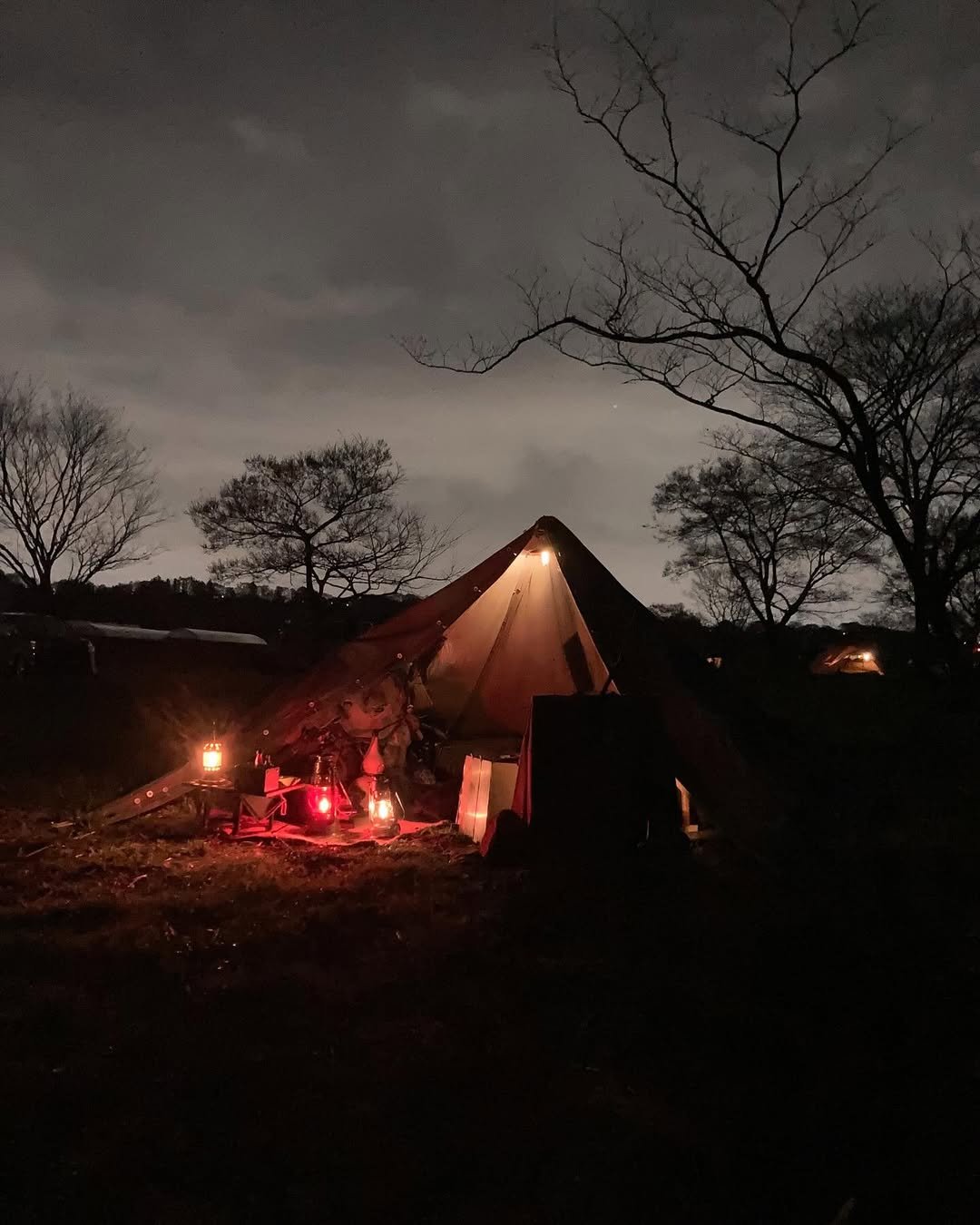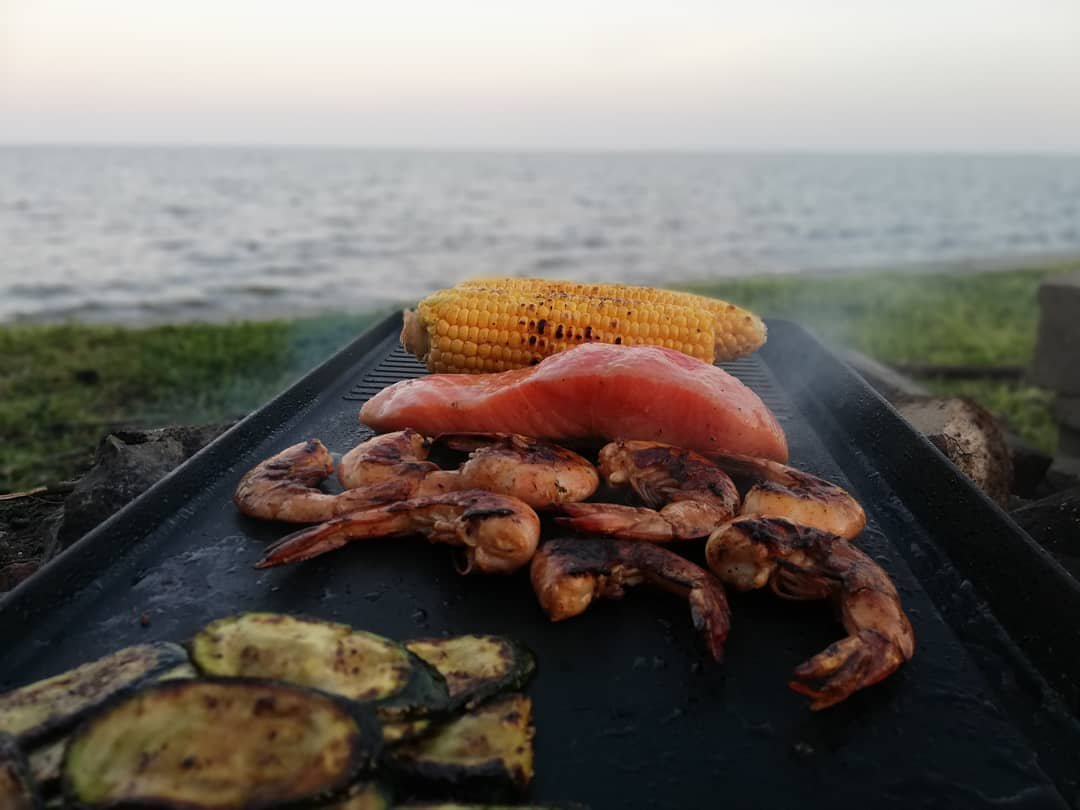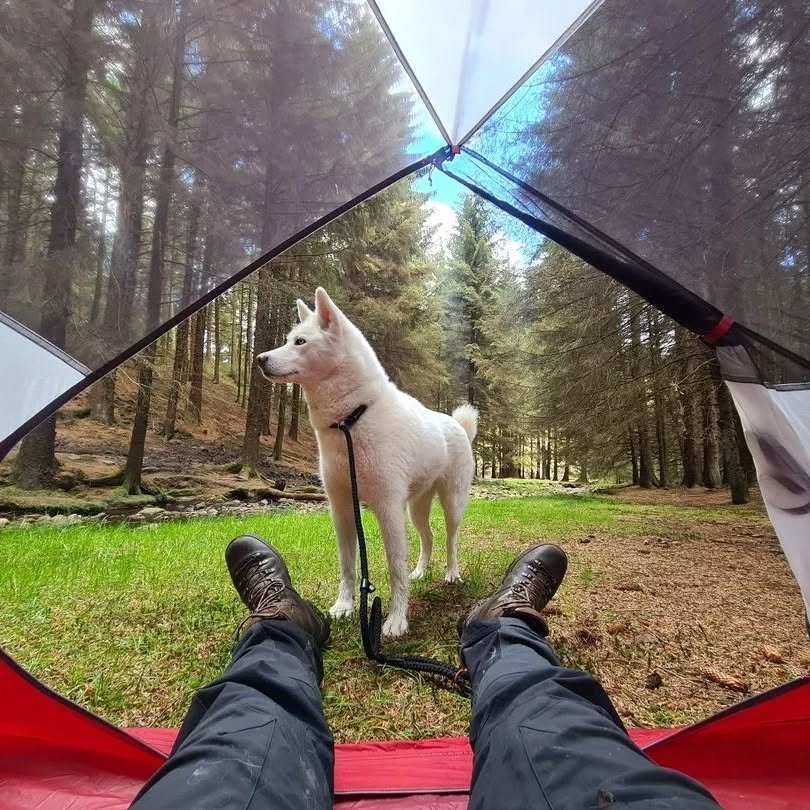Solo camping is always adventurous, but many can be afraid of camping alone, especially if it’s their first trip.
They may feel anxious and develop unnecessary imaged fear. I met some overexcited friends who rarely go outdoors and asked me for some advice.
Fear is reasonable for a sense of alertness, but being overwhelmed is beyond. Here are the best ways not to be afraid while camping alone.
1. Try Solo Camping Close to Home
If you’re a first-time camper or not confident enough to backpack through the wild forest or remote places, you can find a campsite near your home.
I would suggest you begin your solo camping in a familiar area, for example, a park or nearby campsites, amenities, and reservations.
It is a good idea to pitch your tent in the backyard.
This will help you reduce anxiety while building experience. You won’t feel homesick, and you don’t have to travel too far or face weather challenges if that happens.

Bring everything that you need for solo camping and try to experience that you’re away from home or facilities.
Make everything your own, and don’t enter the home once landed in the backyard.
Besides the backyard, nearby campsites also make you feel not so troubled as everything will be accessible without boosting the fear for survival.
2. Prepare and Plan Thoroughly
Preparation is vital to removing surprises and fear, as you need not rush to collect or assemble the essentials for a whole day, ruining your camping fun.
So, make a solo camping checklist.
Include everything from tent and sleeping pads to light, fire starter, food and drink, cooking tool set, and first aid kit.
Don’t forget tools like AllTrails, offline maps, or weather apps for navigation and weather forecasts. Buy or arrange everything and pack it in your fit backpack.

After preparing the essentials, you might need a foolproof plan to execute the first camping trip.
Decide on the campsite, calculate the travel distance (by foot or vehicle), and make a checklist for fun activities.
To make it more professional, you need to schedule your camping journey, whether it is a one-day trip, a two-day trip, or a seven-day trip.
Fix a date for departure and arrival, and how many hours you will spend outdoors.
Plan it before a month of backpacking so you can be mentally prepared, too.
Though everything does not happen as expected, you can control most of the things in the camping through this preparation.
3. Learn Basic Survival and Safety Skills
Fear comes with a lack of skills or knowledge, especially when you try a new experience in a professionally polarized interest.
So, you need some training for basic survival and safety skills.
Building a fire, tying knots, purifying water, building shelter, first aid, navigation, and signaling for help are some skills you will need to learn.

These not only help you in camping but can be a lifesaver for you in any difficult situation, for example, during trapped in remote place or cathestrope.
There are many free online classes and local workshops near your house or apartment.
Don’t boast yourself only watching or listening to the instructors. Even the easiest task can make your hands tremble at first attempt.
Do them yourself at home first, and try them repeatedly until you finally succeed. A few come in handy without much effort, while others can take enough time and effort.
Don’t panic, you will gradually improve after continuous effort.
Once you master these skills, you will notice the confidence built in yourself.
4. Choose a Safe and Legal Campsite
I recommend you invest your time searching for a campsite before choosing a random location.
Familiar, well-reviewed sites make solo camping less scary.
You already know where to start and what you can do there. You can create your day and night schedules or plans accordingly.
Don’t trespass without permission or head to an unexplored place or a place that has no information, only for the sake of adventure.
Find a well-maintained campground or camping area with established norms and guidelines.

Also, if you’re hiking, make sure you return safely to the campsite. Only walk out to a distance that is near to access the safe checkpoint.
Or you need to yell at rangers or fellow campers.
5. Let Someone Know Your Itinerary
Many campers miss out and are trapped in unexpected incidents, as nobody knows their recent location.
So, somebody from your close people should know that you’re backpacking and your destination. This is not a weakness but a safety net that allows others to track you if you’re lost.
I usually call my mom whenever I camp alone in a remote area. If not her, my friends are there!
You can tell them about your campsite location, dates for departure and arrival, and check-ins.
It’s really important to carry a GPS or emergency locator device like Garmin inReach. You can activate it whenever you feel insecure on the trip.
This not only helps you overcome the fear of camping alone but also relieves your loved ones in your absence.
6. Get Entertained
I like to play music, so when I feel there are not many activities to do at the campsite before the trip, I pack my ukulele.

You can take any musical instrument that you enjoy playing, but it should be compact enough to bring on the camping journey.
Besides, Netflix on a smartphone would be a great option for a movie or series lover.
The downloaded playlist of favorite podcasts and songs can also entertain you while camping alone in the area without Internet.
The readers can bring a novel or a book by their favorite author.
These activities help you pass your camping duration easily and encourage you not to be afraid of camping alone.
Also, pack a small item that brings emotional comfort, such as a blanket, a photo, or a favorite snack. These help you calm your nerves in unfamiliar settings.
7. Practice Mindfulness and Breathing Techniques
You must know that fear is only an emotion perceived through an imagined or real threat.
It’s easy to reduce potential camping risks or threats if the trip is planned properly and safety guidelines are followed correctly.
But you need to control your mind to eliminate imagined danger.
For this, you can perform mindful tasks, breathwork, and grounding exercises and live in the present.
While camping alone, use your senses to observe nature and your surroundings. For example, focus on the sound of fire crackling, waterfalls or river flows, and birds chirping.
You can also practice yoga, journal your thoughts, and do walking meditations around your tent.
I tell you, the fear comes with excitement. Whenever you feel anxious or excited, take a deep breath and expel slowly and control your rapid breathing.
Whether camping or hiking, practicing breathing techniques such as diaphragmatic, pursed-lip breathing, humming, and active cycle of breathing techniques helps you stay strong and confident.
You can use meditation apps like Calm or Insight Timer to start.
8. Learn to Identify and Manage Nighttime Fears
Night increases uncertainty and amplifies fears in the darkness.
If you fear the darkness, finish your campfire activities before dusk or nightfall. Prepare your tent and bedding earlier and close your shelter.

You can also make a liquid fence around the tent to repel bugs and animals.
For example, bears don’t come near the smell of bleach. This way, you can buy general-purpose or dry animal repellents for deer and other animals.
It’s challenging to differentiate between real threats and normal forest sounds from the tent wall.
So, you can hit the panic button on your car’s keyfob. This will help you scare them off.
Inside the tent, you can play music using earplugs, play video games, or do nighttime journaling. If you want to sleep peacefully, avoid tea or coffee, don’t take a nap in the daytime, and go to bed according to your usual routine.
9. Build Confidence Through Day Activities
Fear only comes in an empty mind or when you do nothing to produce imagined thought.
So, you need to stay busy with solo camping activities throughout the day. Hiking, sketching, reading, foraging, fishing, and cooking are only a few ideas.

You can try easy, fun activities and move to challenging pastimes when you feel confident.
Don’t allow your second thoughts to be doubt and fear. Engage in different activities, whether physical or mental, and enjoy every moment of your trip.
After a whole busy and active day, you feel healthy exhaustion with a bit of pain in legs, hands or calves if you’r not very physically active person.
This helps you get better rest and sweet sleep.
1o. Bring Your Pet
I love being around my dog, whose company I take everywhere I go.
Why dogs only?
They are fearless, imperious, and adventurous, and need little or no grooming when outdoors.
Australian Shephard, Labrador Retriever, Siberian Husky and Border Collie are a few names that really suit for solo camping.

You can talk, play, and eat with your pet.
Not only this, but dogs are also very protective, which can save you from wildlife in the forest. They can make the best fellow campers when backpacking through remote areas.
Also, they guard your campsite, tent food, and gear essentials in your absence.
11. Join Online Communities for Solo Campers
I learned several camping tips and hacks from online camping communities, and I’m still active in the camping discussion.
You can find fellow campers in Facebook groups, Reddit threads, or camping forums.
They share their gear reviews, camping experiences, and trip reports and get involved in discussions regarding campsites, free fun activities, and camping guides.
In these online communities, you can befriend fellow campers and ask questions for trip guides.
Besides, you can get motivation and inspiration from stories and advice from fellow campers.
Final Thoughts
Some sketchy people can ruin your very first solo trip if you encounter them. I’m lucky that I’ve never met such people on the trail or campsite.
They are more likely to stick around trailheads or a road to have a quick getaway.
So, I suggest you maintain a distance of at least 3 – 5 miles from the trailhead. Also, don’t disclose any specific information regarding your solo camping plans to strangers.

Leave a Reply